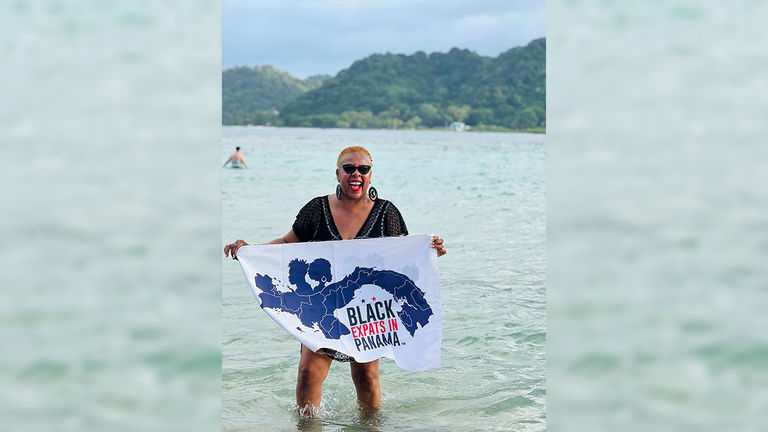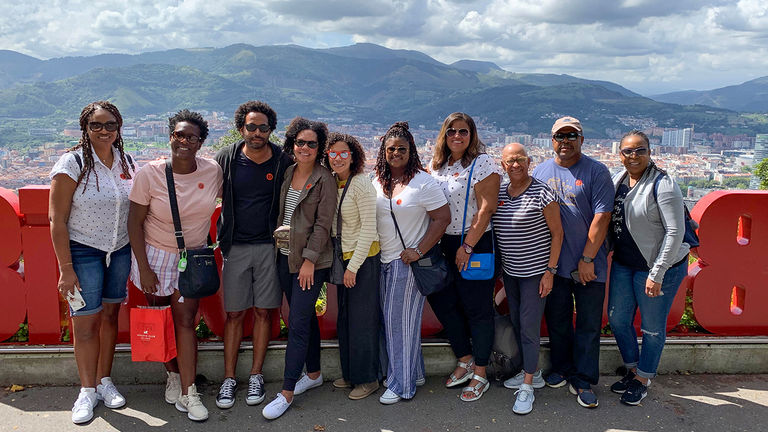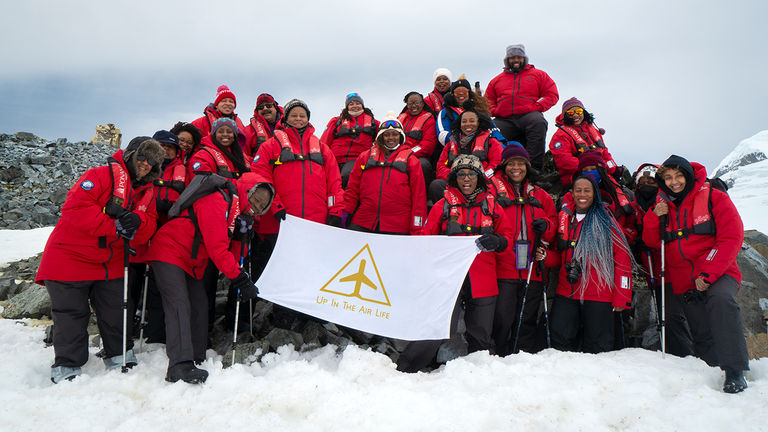As the travel industry continues to embrace a new normal characterized by rapid shifts in service and unpredictable disruptions, travel advisors have become an ally for Black travelers seeking assistance in navigating continued uncertainty both at home and abroad.
This is especially true for advisors who specialize in group travel. Studies show that Black travelers generally prefer to travel in groups and visit destinations specific to Black heritage. This interest is rooted in Black travel patterns resulting from historical racial discrimination, and has grown further since the rise of events involving racial and social injustice in 2020 and beyond.
Furthermore, Black travelers have purchasing power that is hard to deny. According to a 2021 MMGY study, Black American travelers spent $20.2 billion on international leisure trips and $109.4 billion on domestic leisure trips in 2019.
Here’s how travel advisors can use their knowledge, skills and connections to offer one-of-a-kind experiences tailored to the interests of groups of Black travelers.
Pick Destinations Where Black Travelers Will Feel Welcome
Claire Soares believes that feeling safe and seen is a priority for Black travelers. As the founder and CEO of Up in the Air Life, a boutique travel agency offering luxury group trips, Soares knows firsthand that her experience matters, and her clients want to know that she’s been to a particular destination and was treated well there.
Sakeysha Williams, owner of Key Occasions, agrees.
Seeing diversity and representation in the marketing pieces of the destination and supplier go a long way in the selection process.
“There are some locations where Black dollars are not always welcomed or appreciated,” Williams said. “Seeing diversity and representation in the marketing pieces of the destination and supplier go a long way in the selection process.”
In fact, studies show that Black travelers are more likely to visit a destination if they see representation in advertising.
“If destinations would like to attract Black travelers, they need to spend the money to attract Black travelers,” said Dr. Nadeen White, co-founder of the Black Travel Alliance and founder of The Sophisticated Life and Culinary Travels.
 Dr. Nadeen White says that Black travel professionals can provide unique expertise about encountering racism at a destination.
Dr. Nadeen White says that Black travel professionals can provide unique expertise about encountering racism at a destination.
Credit: 2023 Nadeen WhiteWhite notes that there are too many stories about Black travelers encountering racism and safety concerns or being mistaken for hotel staff. From White’s perspective, these types of scenarios are where the expertise of Black travel professionals proves invaluable.
Due to their perceived safety and acceptance of Black travelers, popular destinations include Dubai, Greece, Ghana, Portugal, Panama, Colombia and the Caribbean. These destinations are popular places for Black expats and digital nomads, which is one reason that Charlotte Van Horn, founder of Black Expats in Panama, relocated from the U.S. to Panama with her husband two years ago.
Van Horn thinks it’s important for Black travelers to visit places where they feel secure not only because “feeling safe is a big part of happiness and peace,” but also “to compare the differences between how Black people are treated in the U.S. versus other countries.”
 Charlotte Van Horn is the founder of Black Expats in Panama.
Charlotte Van Horn is the founder of Black Expats in Panama.
Credit: 2023 Black Expats in PanamaNow, she hosts cultural relocation tours, heritage tours and other events throughout Panama and the Americas for both Black travelers and residents of Panama. She says her trips and events offer safe spaces for Black travelers to connect with each other and learn about the country’s Black history.
Provide Comprehensive, Tailored Services
Traveling while Black should not be an obstacle for clients wishing to visit destinations without large minority populations. Elizabeth McCormick, president of Uniglobe Travel Designers, employs a hands-on approach for people who might not feel as comfortable going to certain destinations on their own. By accompanying clients on trips, such as her “President’s Cruise” to places such as Greece, McCormick makes clients feel confident about traveling anywhere in the world.
Regardless of the destination, Black travelers are looking for exceptional experiences, and customer service is a key component of that. McCormick says that “travel will never go back to the way it was pre-pandemic, so travelers really need someone who’s going to take care of everything.”
 A trip by Uniglobe Travel Designers in Bilbao, Spain
A trip by Uniglobe Travel Designers in Bilbao, Spain
Credit: 2023 Uniglobe Travel DesignersCarleton Shephard, founder and CEO of Insider Expeditions, says market research is important, and that travel advisors must understand what has been done, what is overdone, what is missing and what Black travelers want in their trips.
“Group travel can be difficult when you bring together travelers who have diverse backgrounds, different needs, and more importantly, expectations,” Shephard said.
He also suggests that advisors be creative and adaptive and give clients a custom itinerary rather than “pulling something off the shelf.”
Soares of Up in the Air Life also takes a bespoke approach to her trip-planning process, delving into her clients’ hobbies, interests and desires outside of their jobs to create meaningful experiences in the destination that are specific to their preferences.
Williams of Key Occasions says that advisors can provide great benefit to their clients in matters related to entry and exit requirements, country traditions and customs, local language and currency. She notes that advisors should take time to understand each person’s expectations since every group is different.
Offer Flexibility
A common theme among these travel entrepreneurs is building flexibility into the itinerary, packages and payments. Since every traveler’s style, preferences and expectations can differ, it’s best to not design a jam-packed schedule each day of a trip.
Williams, for example, plans only two to three group activities per trip, and offers optional activities for the group because “it allows time for everyone to have fun together, as well as separately, if they prefer.”
Offering different packages, such as single-occupancy and upgraded room categories, will appeal to a broader clientele and can potentially increase revenue. Providing payment plans to clients also makes booking trips more accessible, and fintech companies such as Uplift can assist advisors by offering the full revenues from client bookings upfront.
Flexibility may also mean having adjustable cancellation or rebooking policies and helping clients understand and find travel insurance plans that are suitable for them. When travel advisors offer modifiable policies backed by great customer service, clients may be more inclined to choose them.
Think Outside the Box
One way that advisors can “think outside the box” is by adding surprise elements to their trips. Antoine D. Wilson, owner of A.D. Elite Travels and Melanated Safaris, always finds out if clients are celebrating something special, and if so, he coordinates with the hotels and other suppliers to add in wow factors, such as complimentary bottles of wine and extra perks.
For McCormick, it’s all about introducing Black travelers to places they would not have thought to visit and creating experiences that they have never had before. Like Wilson, McCormick often adds surprise elements to her trips, and she believes that advisors should also consider the long-term goals of their business and cultivate relationships with suppliers that support those objectives.
As for relationships, one of Williams’ niches is destination weddings, which she frequently books throughout the Caribbean, especially in St. Lucia and Barbados. To build in unforgettable bonding moments for the engaged couple and their attendees, she adds subtle relationship-building activities into the itinerary, such as couples’ spa treatments, game nights and competitive challenges.
Marlowe Cuadra, owner of Just Because Romance, who also plans destination weddings, created a customized app for guests to easily communicate with her and for the group to stay updated. She believes that even the smallest details, such as an app or a handwritten note, can make a trip more memorable.
 An Up in the Air Life group trip to Antarctica
An Up in the Air Life group trip to Antarctica
Credit: 2023 Up in the Air LifeSoares is no stranger to thinking big. Her company hosts annual trips all over the world in places ranging from Vietnam to Brazil, and her trips always include special touches such as personalized swag.
Focus on Cultural Experiences
While his clients take all kinds of trips, from adventure to relaxation, Shephard of Insider Expeditions acknowledges that he’s seen a huge demand from Black travelers seeking locations that connect with their roots and allow them to “authentically learn more about their heritage.”
Through his company, he creates multi-night heritage tours, including the upcoming MLK Tours hosted by Martin Luther King III and family, and a Civil Rights Tour of the South with the University of Virginia.
Travel breeds tolerance, and the more that we learn about each other, the more we can realize our commonalities instead of just our differences.
Soares suggests that advisors prioritize cultural experiences over “tourist traps” when planning trips for groups of Black travelers, and offer places and activities that highlight the African history of a destination. This will allow advisors to connect Black travelers with local organizations and more cultural activities beyond the popular tourist attractions. She cites places such as Black art galleries as an example.
According to Wilson, Black travelers value “good food and good music,” so he almost always adds those types of activities to his company’s trips, whether it’s a cooking class in which participants prepare a country’s national dish or a local music festival.
He recommends that travel advisors learn the go-to spots that locals frequent and add them to the trip itinerary. Online travel communities and social media can be valuable resources for advisors looking to stay abreast of ever-changing trends and traveler preferences.
Shanay Braxton, director of operations for the Black Travel Alliance and founder of Business in Travel, suggests that travel planners consider destinations where Black travelers can learn more about the culture and ways of life of people living in majority Black countries such as Rwanda, Senegal and Kenya.
Having worked in the hospitality industry in Morocco for years, Braxton became fully immersed in the country’s culture and traditions. And while most travelers won’t be able to achieve that depth of experience when visiting for only a few days, Braxton believes that choosing places frequented by locals, such as food markets and family-owned shops, is a good start.
White has been dreaming about traveling to Morocco for years, and she chose it as a destination for an upcoming group trip for her travel company, Culinary Travels. Among the types of activities she curates are wine tastings in France and South Africa, truffle hunting in Northern Italy and sampling street food in Thailand.
These types of experiences offer insights into a culture that travelers could never have without actually visiting, and they encourage greater understanding and awareness of different ways of life.
“Travel breeds tolerance, and the more that we learn about each other, the more we can realize our commonalities instead of just our differences,” White said.
One commonality between Black travelers and other travelers is that they share similar desires for escapism, service quality and enrichment, and have “a large variety of interests,” says White.
According to White, some travel professionals and the travel industry, in general, tend to put Black travelers in a box and solely promote Caribbean and cruise vacations to them. But by taking into consideration Black travelers’ unique needs and preferences, travel advisors can create special moments that make Black travelers feel seen, welcome and valued no matter where they go and what they do.